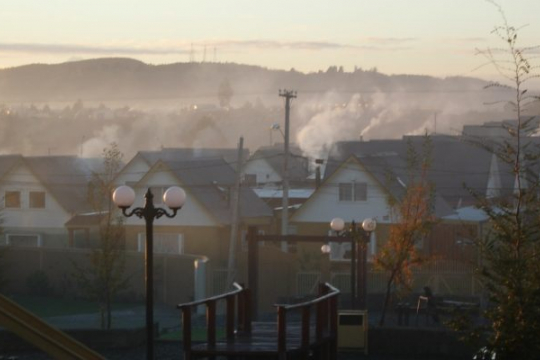The Chilean EfD research team has been working alongside government authorities in the design, evaluation, and application of policy strategies to reduce air pollution in highly contaminated cities.
In Chile, one of the most severe environmental problems is air pollution due to the burning of wood for heating and cooking in households. Places like Temuco and Padre Las Casas are often recognized as the most polluted cities in Latin America. The EfD Chile team including Carlos Chávez, Walter Gómez, Felipe Vásquez, Marcela Jaime, Roberto Ponce, Adolfo Uribe, and César Salazar, has been working for over a decade on different studies that will eventually help in designing, implementing, and evaluating control policies in the country.
Constant dialogue with policymakers
The Chilean government has developed many social programs regarding house heating, such as the prohibition and restriction of the use of wood, especially in many southern regions of the country. Since air pollution is one of the main topics discussed in environmental and energy policy in Chile, several EfD studies in the last decade have been translated into policy briefs to be distributed among policymakers. EfD's team has provided the environmental authorities with the insights needed to create a stove replacement program and has been working alongside them with its design and formulation.
Generates benefits for households
The team led a study on estimating the key private benefits of a program to replace inefficient wood-burning heating stoves with more efficient pellet stoves. The main lessons learned were: the stove replacement program generates private benefits that may support adoption. Lower-income households and those with higher levels of energy poverty are the main beneficiaries. Given the high cost of pellets, the sustainability of the program must be revisited.
The team designed the first pilot program of what later became a national policy, turning NENRE EfD-Chile into a benchmark in this field. Thanks to their many studies on energy poverty, perceptions, and preferences on air pollution, behavioral aspects, and even the Covid-19 impact, the government has asked for the collaboration of EfD's researchers in regional offices as advisors in hopes of finding better ways to solve this issue considering the different characteristics of each area.
EfD researchers appointed as advisors
Walter Gómez has participated as part of the advisory board for the Atmospheric Decontamination Plan (PDA) in Temuco, a unit of the Chilean Ministry of Environment. César Salazar has been appointed to become the energy delegate in Ñuble, another southern region, advising the regional government.
Creating learning and collaboration spaces
Influencing air pollution research and policies means contributing through collaborative research, consultancy, advisory, and instances to teach, discuss, and train others in the field. Therefore, this decade-long work has also generated several activities at NENRE EfD-Chile's Annual Meetings, including:
- Policy interaction panels on the role of policy instruments to promote transitions to cleaner energy sources,
- Lectures in workshops, including a presentation titled Gendered aspects of environmental health improving technology adoption and impacts: Evidence and implications for policy by Marc Jeuland,
- Training courses intended to help policymakers understand the social effect of environmental problems, consultancy activities for characterizing and modeling available information explaining fuelwood consumption and its links with air pollution in rural areas,
- and the training of technical staff to provide them with the skills needed to make better use of available information as input for decision-making.
Going global in the issue of air pollution
The EfD Chile members benefit from leading and being part of the Sustainable Energy Transitions Initiative, an extensive collaborative program and network of researchers and policy actors working on energy issues in the Global South, including Chile. In the framework of this program, EfD Chile researchers have also invited policymakers to discuss the problems of air pollution with an international audience, serving as a model to connect stakeholders and discuss the air pollution problem from a global perspective.
To access research on air pollution by EfD Chile, click here!
Some of the activities described in this article can be found in the news section of NENRE EfD Chile here.
By Belén Pulgar.
